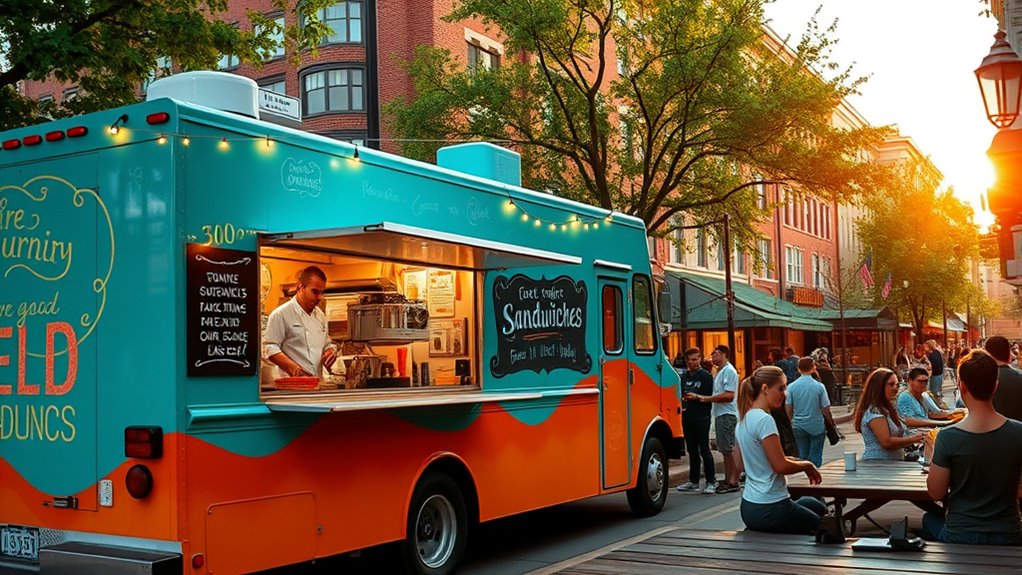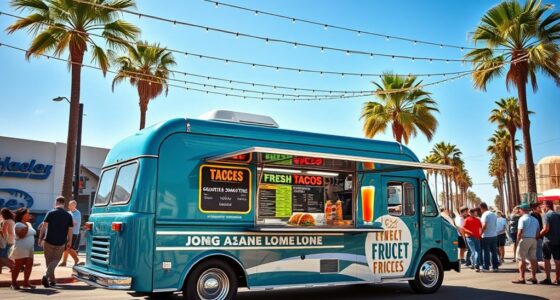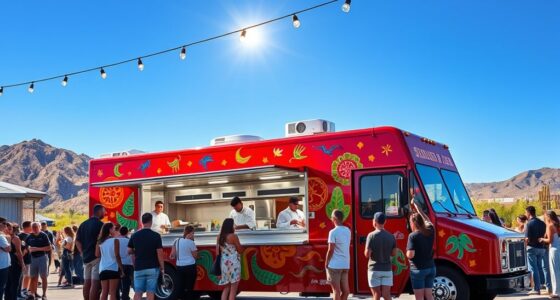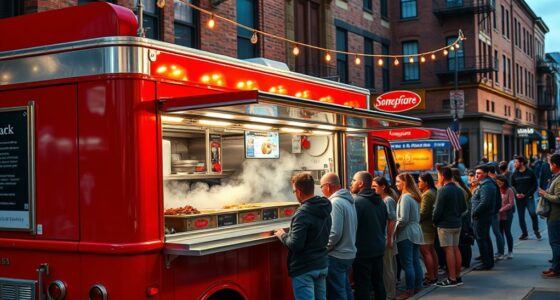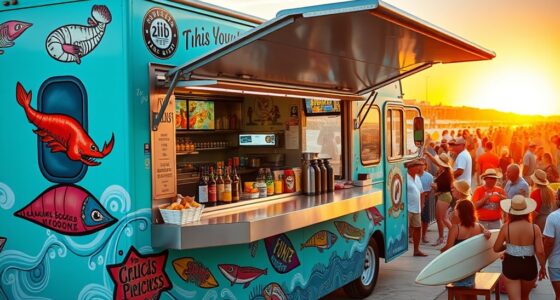To start a food truck in Louisville, KY, you need to obtain the necessary permits and licenses through Louisville’s online portal, ensuring compliance with local vehicle and zoning regulations. Find approved vending zones and secure permits for busy areas like festivals, markets, and event venues. Budget for vehicle modifications, equipment, insurance, and permits, and consider grants or funding options. Focus on creating a compelling menu and building community engagement. Continue exploring each step to turn your food truck idea into a successful Louisville business.
Key Takeaways
- Obtain necessary permits and licenses through Louisville’s online portal, ensuring compliance with local health and vehicle regulations.
- Identify approved vending zones and target high-traffic areas like festivals and public spaces for maximum visibility.
- Set up cost-effective operations by exploring shared kitchens, purchasing essential equipment, and planning for vehicle modifications.
- Secure funding via local small business grants and purchase comprehensive insurance to protect your investment.
- Develop a strong marketing strategy using themed menus, social media, and community engagement to build customer loyalty and grow your presence.
Starting With a Food Truck License
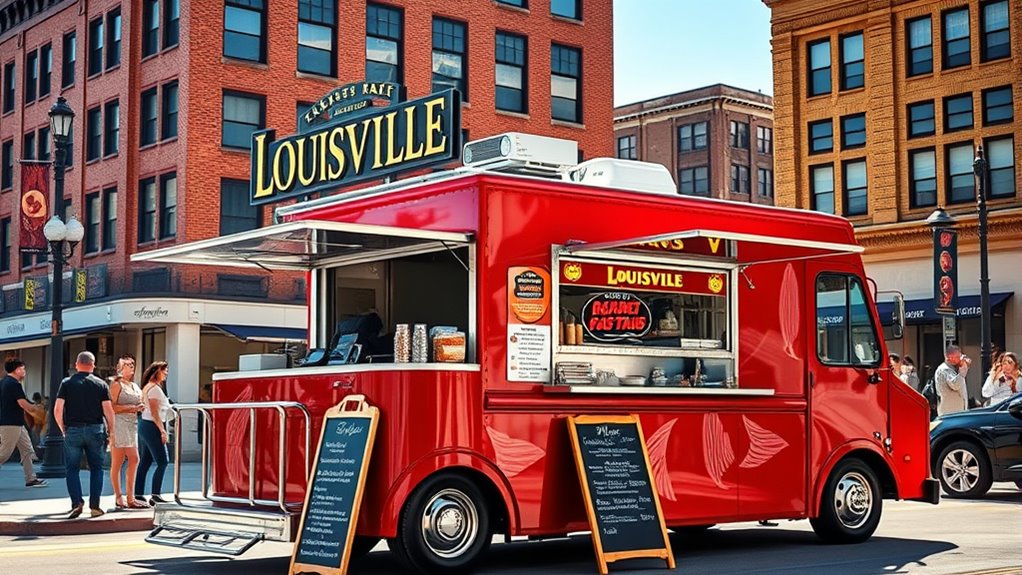
Getting your food truck license is the vital first step before hitting the streets of Louisville. To start, you need to obtain the proper food truck permits, which guarantee your vehicle and operations meet local health and safety standards. These permits are essential for legal compliance and help you avoid fines or shutdowns. Once you secure your initial permits, remember that licenses often require renewal annually or biennially. Staying on top of license renewal deadlines keeps your business compliant and prevents interruptions. The process typically involves submitting renewal applications, paying fees, and possibly passing updated health inspections. By managing your food truck permits and license renewals diligently, you set a solid foundation for a successful food truck venture in Louisville. Additionally, understanding local vehicle regulations related to mobile food vendors can help you navigate licensing requirements more effectively.
Understanding Local Requirements
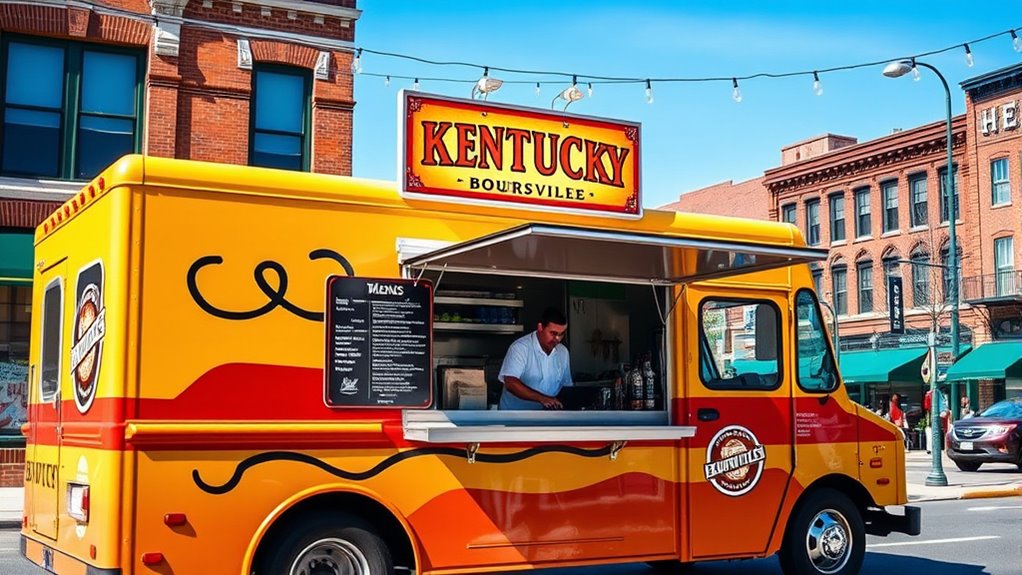
To get your food truck up and running, you’ll need to navigate Louisville’s online permit application portal and complete all necessary paperwork. During inspections, pest control measures are crucial to pass health standards, so plan accordingly. Additionally, you should familiarize yourself with designated street vending zones to ensure you’re operating legally and in the right locations. Implementing proper hygiene practices is essential to maintain health standards and ensure a successful operation.
Online Permit Application Portal
Since Louisville has streamlined its permit process, you can now complete most applications through the city’s online portal. The online permit application portal makes it easy to submit all necessary documents and pay fees without visiting city offices. You’ll want to create an account and gather required information, such as your business details and vehicle specifications. The portal guides you step-by-step, ensuring you don’t miss any critical details. Once you submit your application, it’s processed more quickly than traditional paper submissions. Keep an eye on your email for updates or additional requests from city officials. Using the online permit application portal saves you time and helps you stay organized throughout the approval process, making starting your food truck in Louisville more straightforward.
Pest Control During Inspections
During food truck inspections in Louisville, pest management is a critical focus for city officials to guarantee public health and safety. Proper pest control ensures your truck passes inspection readiness checks and avoids violations. Inspectors look for signs of pests like rodents or insects that could contaminate food. To prepare, regularly clean all surfaces, store food properly, and seal entry points. Be proactive by scheduling routine pest control treatments before inspections.
| Pest Control Step | Inspection Focus |
|---|---|
| Routine Treatments | Signs of pests |
| Proper Storage | Food safety |
| Seal Entry Points | Pest entry prevention |
| Clean Surfaces | Overall hygiene |
Designated Street Vending Zones
Understanding the designated street vending zones in Louisville is essential for legally operating your food truck. Local street vendor regulations specify where you can set up, so you must identify approved vending zones to avoid fines or penalties. You’ll need to obtain vending zone permits for these specific areas, which show you’re authorized to sell food there. These permits ensure you comply with city rules and help coordinate your location choices with other vendors. Carefully review Louisville’s zoning maps and regulations to find suitable spots. Keep in mind that vending zone permits are often limited, so applying early improves your chances of securing a spot. Following these guidelines helps you operate smoothly and avoid legal issues while serving customers in designated areas.
Setting Up Your Base of Operations
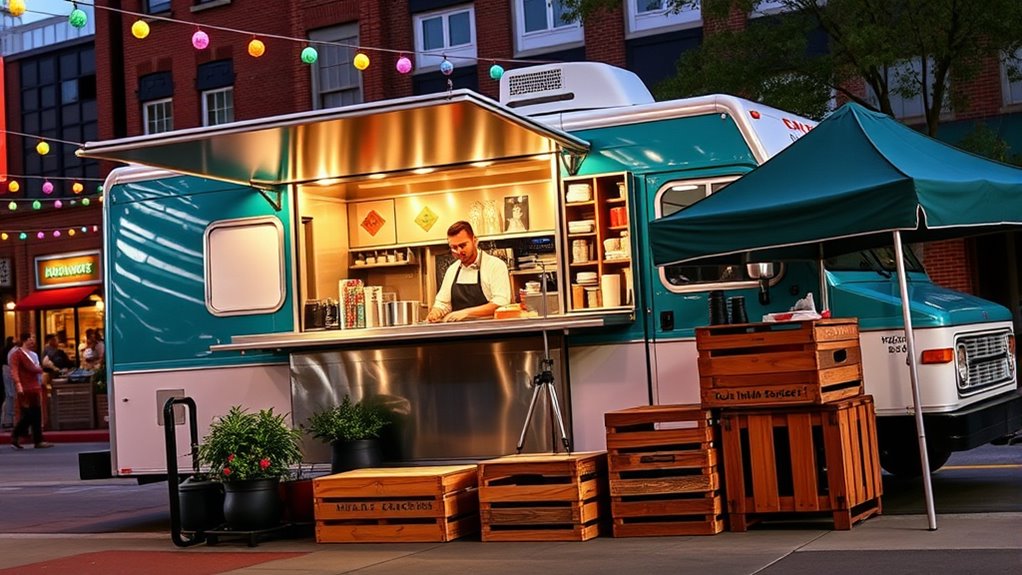
To get your food truck up and running, you’ll need a reliable base of operations. Shared kitchen licensing options can save you money and simplify compliance, so consider local facilities that fit your needs. Make sure you have essential commercial kitchen equipment like refrigerators, stoves, and prep stations to keep your operation efficient. Incorporating essential oils for hygiene into your cleaning routine can also help maintain a fresh and sanitary environment.
Shared Kitchen Licensing Options
Setting up your food truck’s base of operations often involves choosing a shared kitchen, which can be a cost-effective and flexible licensing option. Shared kitchen licensing allows you to operate in a licensed facility without the high costs of a dedicated commercial space. These kitchens typically comply with kitchen co-op regulations, ensuring they meet health and safety standards required by Louisville authorities. By joining a shared kitchen, you benefit from existing permits and inspections, saving you time and effort. This setup also fosters a community of local food entrepreneurs, providing networking opportunities. Just make sure to verify that the shared kitchen’s licensing aligns with Louisville’s food truck regulations, so your operation remains compliant and ready for business.
Commercial Kitchen Equipment Essentials
Equipping your food truck with the right commercial kitchen tools is essential for efficient and compliant operations. Your equipment should support your cooking techniques, whether you’re grilling, frying, or assembling dishes quickly. Focus on essentials like a quality stove, refrigeration units, and prep surfaces that align with your menu design. Smart equipment choices help streamline meal prep, ensuring consistency and speed. Consider appliances that fit your planned dishes and cooking methods, making it easier to execute your menu seamlessly. Proper setup also guarantees compliance with health regulations and safety standards. By investing in versatile, durable equipment, you’ll create a solid foundation for your food truck’s operations, allowing you to focus on delivering delicious food and excellent service to your customers.
Budgeting and Financing Your Food Truck

To get your food truck off the ground, you need to plan for costs like vehicle modifications and insurance. You should also explore local small business grants that can help ease your financial burden. Understanding these expenses upfront will set a strong foundation for your budgeting and financing efforts. Additionally, researching popular Frozen Yogurt options can attract more customers to your truck, especially during the warmer months.
Initial Vehicle Modification Costs
Initial vehicle modification costs can vary widely depending on your food truck’s size, equipment needs, and local labor rates. Vehicle customization is a major factor, as you’ll need to install kitchen appliances, shelving, and safety features. These modifications can range from basic setups to fully customized interiors, affecting your overall budget. Additionally, paint job costs are important; a high-quality, eye-catching design can enhance your brand and attract customers, but it may add to your expenses. Expect to spend anywhere from a few thousand dollars for minimal upgrades to tens of thousands for extensive modifications. Planning ahead for these costs guarantees you stay within your budget and avoid surprises once the work begins. Remember, investing in quality now can pay off in customer appeal and long-term durability.
Local Small Business Grants
Securing local small business grants can be an effective way to finance your food truck startup without taking on debt. These grants provide funding specifically for entrepreneurs like you, making it easier to cover equipment, permits, or initial operating costs. In Louisville, KY, many organizations and government programs offer small business grants to support local food truck ventures. To access food truck funding through these grants, you’ll need to research eligibility requirements and prepare a strong application highlighting your business plan and community impact. Applying for grants can help reduce your financial burden and improve your cash flow during startup. Keep in mind, while grants are competitive, they’re a valuable resource to help you get your food truck rolling without the pressure of repayment.
Food Truck Insurance Requirements
Understanding insurance requirements is essential when budgeting and financing your food truck, as they directly impact your startup costs and ongoing expenses. Proper coverage ensures you’re protected against liabilities and accidents, which are common in the food truck industry. Here are key points to consider:
- Liability coverage is mandatory to protect against damages or injuries caused by your truck.
- Vehicle registration costs vary and are necessary to operate legally on Louisville roads.
- Insurers may require proof of vehicle registration before issuing policies.
- Additional coverage options, like comprehensive or collision, can help cover repairs or theft.
Making certain you meet these insurance requirements helps you stay compliant and financially secure as you launch your food truck venture.
Designing Your Menu and Pricing Strategy
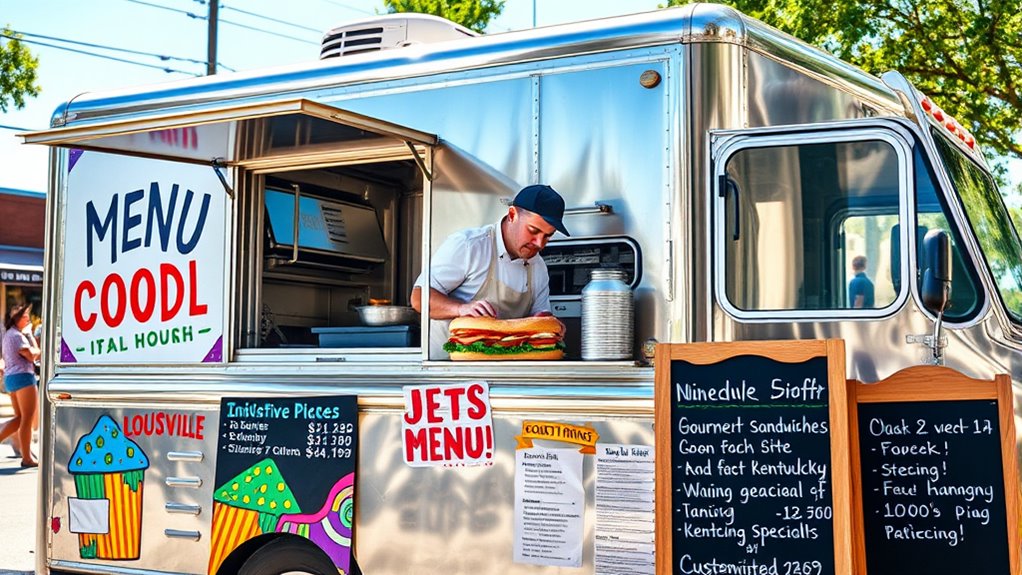
When designing your menu and pricing, focusing on locally sourced ingredients can set your food truck apart. Knowing how to accurately calculate ingredient costs helps you set competitive prices while maintaining quality. Additionally, understanding the importance of balancing cost and quality ensures your menu remains profitable and appealing to customers. By balancing these elements, you’ll create a menu that appeals to customers and keeps your business profitable.
Locally Sourced Ingredient Selection
Choosing locally sourced ingredients is a strategic move that can elevate your menu and attract health-conscious customers. Embracing farm-to-table principles and seasonal produce guarantees freshness and supports local farmers. This approach allows you to craft dishes that highlight Louisville’s regional flavors and appeal to customers seeking authentic experiences.
Here are some ideas to get started:
- Partner with nearby farms for regular deliveries of seasonal produce.
- Create a rotating menu based on what’s freshest during each season.
- Highlight local ingredients on your menu to attract eco-conscious patrons.
- Incorporate farm-to-table concepts into your pricing strategy to reflect quality and freshness.
Using locally sourced ingredients boosts your food truck’s reputation and helps you stand out in Louisville’s vibrant food scene.
Ingredient Cost Calculation Techniques
Accurately calculating ingredient costs is essential for setting a menu that balances quality and profitability. By performing effective cost analysis, you can determine the true expense of each dish and set appropriate prices. Start by tracking ingredient prices regularly to ensure your pricing remains competitive. Use this simple table to help with ingredient pricing:
| Ingredient | Cost per Unit |
|---|---|
| Lettuce | $0.50 each |
| Chicken | $3.00/lb |
| Spices | $0.10/serving |
Understanding these costs helps you identify high-expense ingredients and adjust your menu accordingly. This approach ensures your pricing strategy covers costs while maintaining attractive margins, ultimately maximizing your food truck’s profitability. Proper cost analysis guides your decisions and keeps your business sustainable.
Technology and Operations
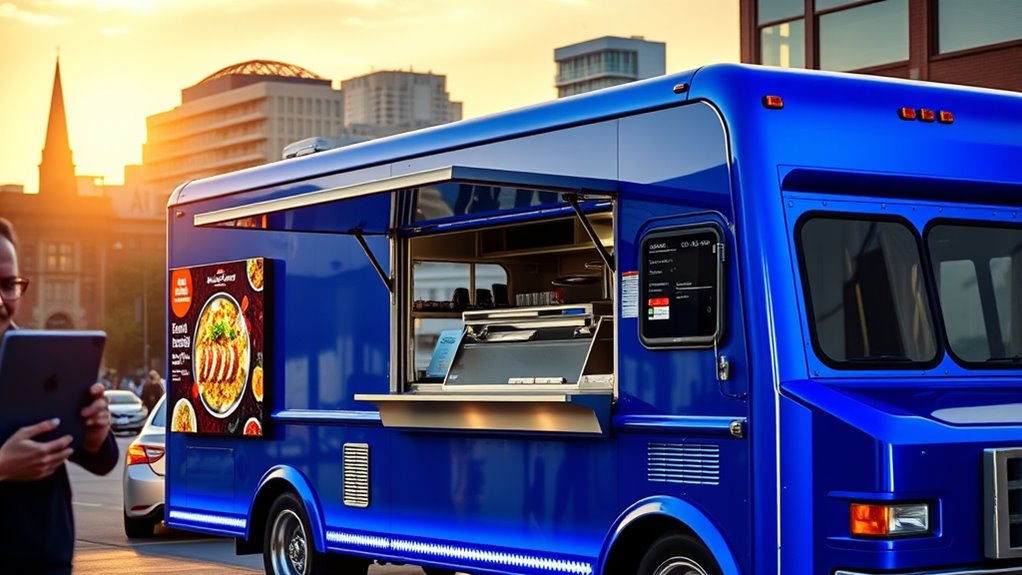
Using wireless card readers allows you to accept payments quickly and move seamlessly between locations. Mobile inventory tracking apps help you stay organized and reduce waste during busy service hours. Incorporating these technologies can streamline your operations and keep your food truck running smoothly.
Wireless Card Readers for Mobility
Wireless card readers have become essential tools for food truck operators who need mobility and efficiency. They enable quick, secure transactions, supporting contactless payments and enhancing sales mobility. With wireless technology, you can accept payments anywhere, whether at crowded events or remote locations, without being tied to a stationary terminal. This flexibility helps you serve customers faster and reduces wait times. To maximize benefits, consider these key features:
- Compatibility with multiple payment types
- Robust security measures
- Ease of use and quick setup
- Battery life for all-day operation
Mobile Inventory Tracking Apps
Have you ever struggled to keep track of your inventory on the go? Mobile inventory tracking apps make managing your stock easier and more accurate. These apps allow you to perform inventory management and stock tracking in real-time, directly from your smartphone or tablet. With features like barcode scanning, automatic updates, and alerts for low stock, you can stay on top of your supplies without returning to a base computer. They help reduce errors, prevent shortages, and save time during busy hours. Plus, many apps integrate with your POS system, providing seamless inventory management across all operations. Using a mobile inventory tracking app means you can focus more on serving customers and less on manual stock counts, ensuring your food truck runs smoothly and efficiently.
Marketing and Growing Your Presence
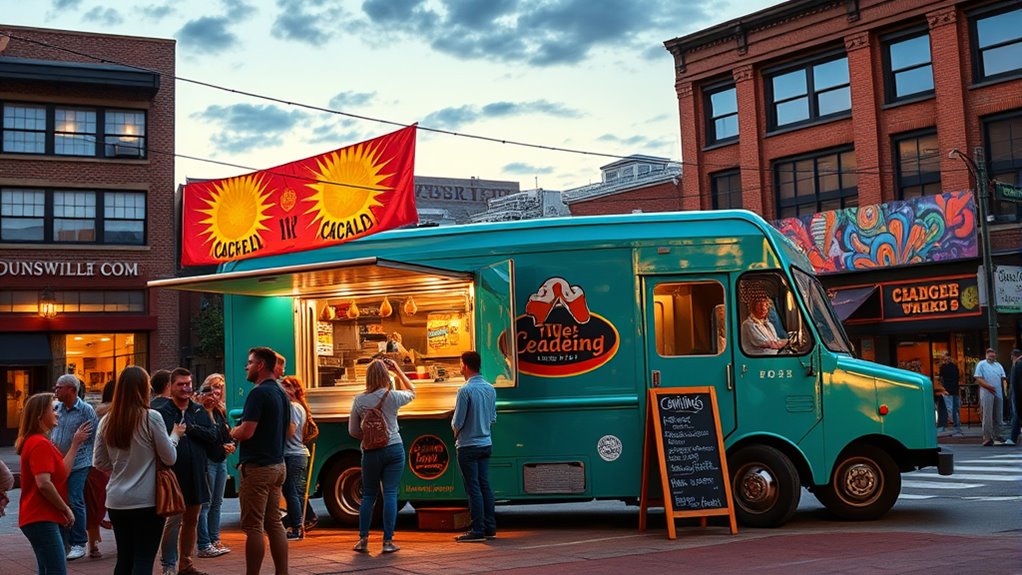
To boost your visibility, plan a weekly event calendar that highlights your truck’s locations and special offerings. Incorporate themed food specials each week to attract repeat customers and generate buzz. Consistently promoting these activities keeps your presence fresh and top of mind in the Louisville food scene.
Weekly Event Calendar Planning
Creating a well-organized weekly event calendar is essential for marketing your food truck and building a steady customer base in Louisville. It helps you target the right audiences and maximize exposure. When planning your weekly schedule, consider these key ideas:
- Identify high-traffic locations and recurring events for consistent visibility.
- Coordinate with local event organizers to secure prime spots.
- Promote upcoming appearances on social media to boost attendance.
- Keep your food truck licensing tips in mind, ensuring permits are up-to-date for each event.
A detailed weekly event calendar boosts your marketing efforts, increases brand recognition, and helps you refine your food truck licensing tips by understanding peak times and locations. Stay organized to grow your presence effectively.
Weekly Themed Food Specials
Implementing weekly themed food specials is a powerful way to attract new customers and keep your regulars excited. By highlighting seasonal flavors, you create a sense of freshness that appeals to diners seeking variety. Each week’s theme gives your menu a unique twist, encouraging repeat visits and boosting customer loyalty. Promote these specials through social media and your signage to generate buzz. When customers see creative, limited-time options, they’re more likely to share their experience and recommend your truck. Consistently changing themes also position you as an innovative, community-focused business. Use local ingredients and seasonal flavors to connect with Louisville’s vibrant food scene. This strategy not only increases foot traffic but also builds a loyal customer base enthusiastic to see what’s next.
Navigating Louisville’s Food Scene
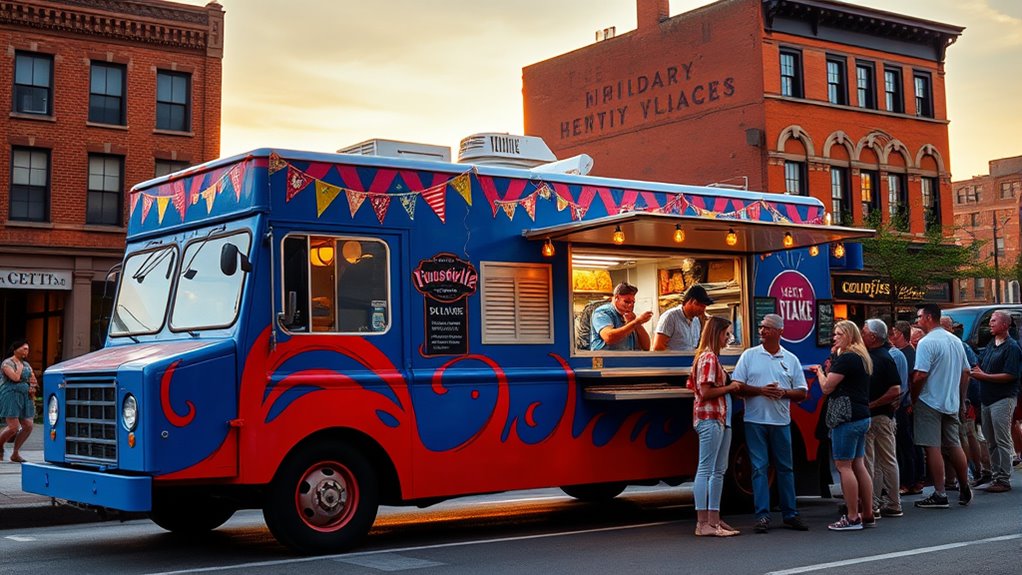
Louisville’s vibrant food scene offers plenty of opportunities for new food truck owners to find their niche. To succeed, you need to understand where the action happens. The city’s street art and murals create eye-catching backdrops for your truck, drawing attention in popular spots. Music venues like the Louisville Palace and Waterfront Park host large events, offering prime locations for foot traffic. Consider these ideas:
- Partner with local street art festivals to showcase your food.
- Position near busy music venues during performances and concerts.
- Explore areas with vibrant street art murals for daily foot traffic.
- Engage with local events, markets, and festivals for increased visibility.
Frequently Asked Questions
What Permits Are Required for Street Vending in Louisville?
To street vending in Louisville, KY, you need a vendor license and guarantee you’re compliant with parking regulations. You must apply through the Louisville Metro Department of Public Works for the vendor license, which verifies your business. Additionally, check parking regulations to find suitable spots where vending is permitted. Always stay updated on local ordinances to avoid fines and ensure smooth operations for your food truck.
How Do Health Inspections Impact Food Truck Operations?
Health inspections directly impact your food truck operations by ensuring food safety compliance. During inspection procedures, health officials review your truck’s cleanliness, food storage, and handling practices. Passing these inspections is vital to stay open and avoid fines or shutdowns. Regularly maintain high standards, train staff on safety protocols, and address any violations promptly to keep your food truck compliant and running smoothly in Louisville.
Are There Specific Event Permits for Food Trucks in Louisville?
Yes, Louisville requires specific event permits for food trucks. You’ll need to apply through the Louisville Metro Government’s permits office, especially for special events or festivals. This process supports your food truck marketing efforts by allowing you to participate in popular gatherings, showcase culinary innovation, and attract more customers. Securing the proper permits guarantees compliance and helps you build a reputation as a reputable, innovative food truck operator in Louisville.
What Are Common Challenges Faced by Food Truck Owners Here?
You’ll face challenges like parking restrictions that limit where you can operate, making it tough to find consistent spots. Competition challenges also pose a problem, as many food trucks vie for the same audiences and prime locations. Balancing these issues requires strategic planning, building relationships with event organizers, and staying flexible to adapt to Louisville’s unique regulations and market dynamics. Staying proactive helps you overcome these common obstacles.
How Can I Partner With Local Businesses or Events?
Partnering with local businesses or events is like planting seeds for success. You can reach out to local business collaborations and propose catering or cross-promotions to boost visibility. Attend community events and explore event sponsorship opportunities where your food truck can serve attendees. Building relationships through social media and networking also helps you stay top of mind. By actively engaging, you turn every opportunity into a step toward growing your food truck’s presence.
Conclusion
Starting a food truck in Louisville is like planting a seed—your passion and effort will help it flourish. With the right licenses, a solid plan, and a splash of creativity, you’ll turn your culinary dreams into a tasty reality. Remember, every great journey begins with a single step—so roll up your sleeves and make your mark on Louisville’s vibrant food scene. Your truck is ready; now it’s time for the city to savor your success.
